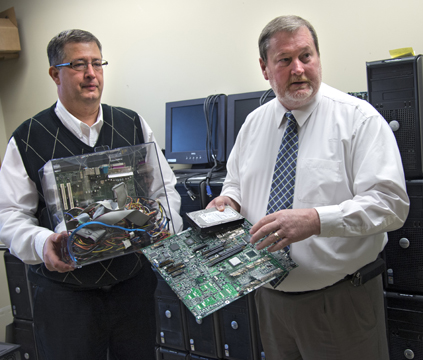Desktop computer recycling helps environment, provides revenue
October 26, 2012
 |
|
Mark Schock, materials management and
distribution operations manager, left, and Mike Wilkins, director of materials
management and distribution, hold computer components that will be recycled.
(Purdue University photo/Mark Simons) |
Outdated or older desktop computers, which many would consider trash, are now reusable or recyclable thanks to an innovative University program.
As the result of a campus-wide collaboration involving representatives of the Physical Facilities Warehouse and Surplus and Radiological and Environmental Management (REM) departments and ITaP, computer components are securely reused or recycled using an approach that is fiscally and environmentally responsible. Today (Oct. 26), Purdue celebrates this and other efforts to enhance recycling on campus as part of Green Week’s focus on “reduce, reuse and recycle.”
Mike Wilkins, director of materials management and distribution (MMAD), says that the Warehouse and Surplus department achieved its goal of no longer sending any computer desktop waste to landfills by recently partnering with a Chicago-based vendor, which buys the plastic used in the devices’ cases. Previously, the University had no way to recycle that material.
“I am not aware of any other university in the country that can honestly claim to divert 100 percent of materials from unwanted desktop computers,” Wilkins says. “At Purdue, we view ourselves as leaders -- so it’s important for us to stay on the cutting edge. Our work with electronics recycling and sustainability distinguishes Purdue as a model for our peers.”
During 2011-12, the amount of computer desktop materials recycled more than doubled from the previous year. The University recycled more than 8 tons of circuit boards and plastic during 2011-12, Wilkins said.
Not all unwanted computers on campus are destroyed, however. Warehouse and Surplus staff install new hard drives -- along with a copy of the computer’s original operating system -- into discarded computers that still function. The computers then are sold to the general public for about $250 each. Fifty percent of the proceeds of those sales are diverted back to the departments that owned the computers.
During 2008-09 -- the first year of the resale program -- computer sales netted owning departments $10,000. This year, so far that number has jumped to $105,000, Wilkins says.
In addition to recycling circuitry and plastic, Warehouse and Surplus staff members shred and later recycle all hard drives from unwanted computers. Power cords and aluminum and metal cases also are recycled.
The University’s efforts to reuse or recycle e-waste this spring earned the Warehouse and Surplus department first place in the inaugural electronics division of RecycleMania 2012, a competition among U.S. universities and colleges.
For a month, Warehouse and Surplus staff kept track of the weights of printers, monitors, computers, televisions and miscellaneous electronics that were sold through the Surplus Store or recycled. Purdue's monthly winning total was 69,965 pounds, finishing ahead of other major universities such as Michigan State, Michigan, UCLA, Duke, Pitt and Harvard.
In July, the University received an Effective and Innovative Practices Award from APPA, a professional organization focused on leadership in educational facilities.
Mark Schock, MMAD operations manager, says finding innovative ways to recycle unwanted electronics is an environmentally friendly way to augment budgets campus-wide.
“Recycling electronics is a great way to offset budgetary challenges and create more revenue,” Schock says. “In the future, we hope more departments will become aware of our computer recycling program, so our efforts can provide an even greater benefit to the University.”
Writer: Amanda Hamon, 4-61325, ahamon@purdue.edu

